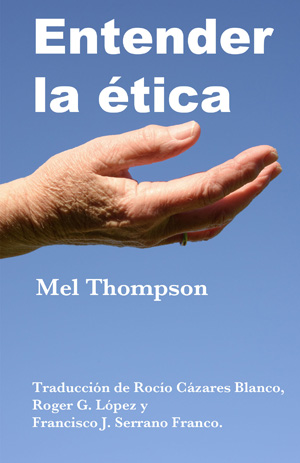Ethics...
 In my view, ethics is the most relevant of
all subjects - it is fundamental to living the good life in
every sense. Ethics is always moving on; the
theories and principles remain the same, but the issues and
their relative importance are always changing.
In my view, ethics is the most relevant of
all subjects - it is fundamental to living the good life in
every sense. Ethics is always moving on; the
theories and principles remain the same, but the issues and
their relative importance are always changing.
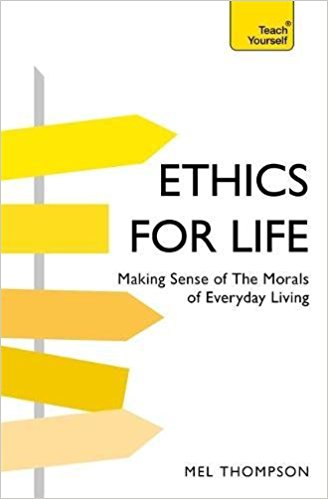 For a basic introduction to the subject...
For a basic introduction to the subject...
This book gives Understand Ethics (in Hodder's Teach Yourself series) an up-date and personal twist. For more information, just click the cover.
It is available in both print and ebook editions.
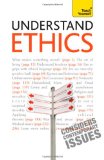 From an Amazon review of the earlier edition - Understand Ethics:
From an Amazon review of the earlier edition - Understand Ethics:
'A great book either to dip into or to read cover-to-cover. The sheer clarity and accessibility of the language (and hence of the descriptions of complex concepts) never fails to amaze me.'
 Can the study of ethics make you a morally better person?
Can the study of ethics make you a morally better person?
Can studying ethics be a quick root to sainthood? Is there a danger that you might become morally smug? Could ethics make you cynical about human nature?
You can study religion without becoming religious. Can you study ethics without becoming more sensitive to moral issues? Read more
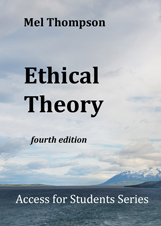 Ethical Theory (Access for Students Series)
Ethical Theory (Access for Students Series)
This textbook on Ethical Theory, originally published by Hodder Education, is now available cheaply in both paperback and ebook editions. Click the cover to see more.
Now in its fourth edition!
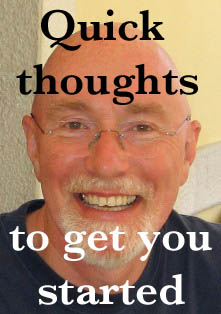 New to Ethics? Here are some quick thoughts to get you started...
New to Ethics? Here are some quick thoughts to get you started...
Why be moral? / Should you be free to injure yourself? / It's all relative! / Revenge or self-defence? / Do you own your genes? / Do you have a right to live or die? / What if torture gets results? / Is there a drink in this for me?
Just click my image to take a look and get your discussion started...
The Holocaust
The greatest ethical challenge of the 20th century. See my views of Laurence Rees' book by clicking here.
Is progress in ethics an illusion?
We live in a world of change... (see more)
 Chance Encounters: a Bioethics for a Damaged Planet
Chance Encounters: a Bioethics for a Damaged Planet
by Kristien Hens, published by OpenBook Publishers
and available as a FREE pdf. See my brief review here.
 'In terms of secular ethics, Aquinas embraced Aristotle and strangled him at the same time!'
'In terms of secular ethics, Aquinas embraced Aristotle and strangled him at the same time!'
 'In terms of secular ethics, Aquinas embraced Aristotle and strangled him at the same time!'
'In terms of secular ethics, Aquinas embraced Aristotle and strangled him at the same time!'To see my views on Natural Law, written for A-level students and originally published in Dialogue, click here. And for a general introduction to Natural Law click here.
(The image shows Aquinas practising his strangle-hold!)
Here are my notes on two ethical theories that have dominated much modern discussion:
Kant's Ethical Theory, Utilitarianism,
And for a general introduction to the challenge posed to ethical language by Logical Positivism, the resulting theories of emotivism and prescriptivism, and what ethical language is about generally: Meta Ethics

If you need to look up anything from 'Anselm, Saint' and 'Animals, moral status of' to 'Zeno's paradoxes and 'Zombies': just click here. This really is an amazing resource for anyone interested in philosophy.
 Thought Experiments in Ethics
Thought Experiments in Ethics
Fed up with diverting trolleys, pushing fat men off bridges or killing one hostage to save twenty? Not sure whether you are prepared to be medically hooked up to a famous violinist for nine months or whether that pig really does want to be eaten? Thought experiments have become an common feature of ethical arguments, but how should we treat them and what are their limitations?
Here is the draft text of a talk, given by Richard Baron in June 2017, on this fascinating topic. To download the pdf file, and to see some other stuff on thought experiments, click here.

 Sexy carrots...
Sexy carrots...